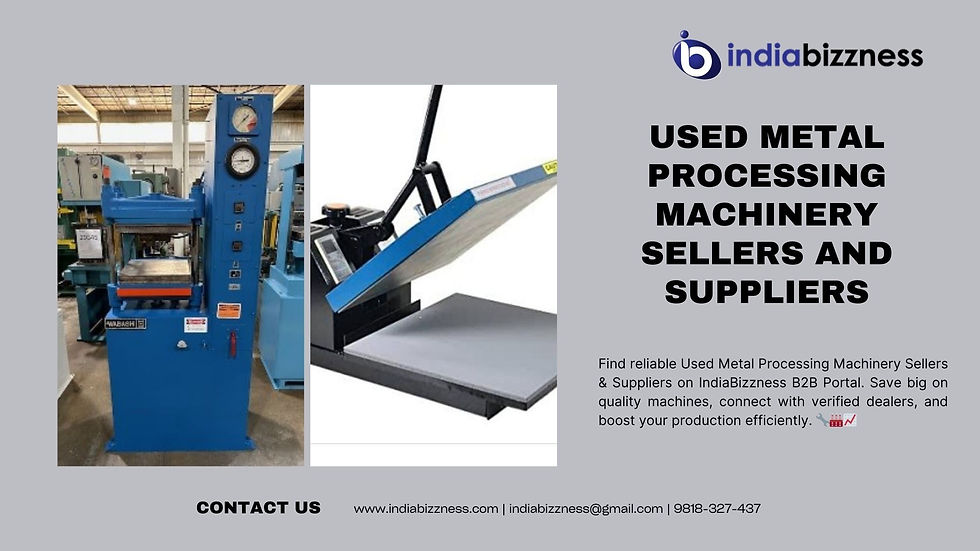Unlocking Opportunities: A Guide to Purchasing Used Manufacturing Plants in India
- indiabizzness99
- Feb 26, 2024
- 4 min read
India's manufacturing sector plays a crucial role in driving economic growth and employment opportunities. As industries evolve and upgrade their equipment, there's a growing market for used manufacturing plants. Whether you're a seasoned industrialist looking to expand your operations or an entrepreneur venturing into manufacturing, purchasing a used manufacturing plant can offer significant cost savings and expedite your entry into the market.
In this blog, we'll explore the ins and outs of buying used manufacturing plants in India, covering everything from the benefits and considerations to the steps involved in the purchasing process.

Benefits of Buying Used Manufacturing Plants:
Cost Savings: One of the most significant advantages of purchasing a used manufacturing plant is the cost savings compared to buying new equipment. Used plants are typically available at a fraction of the cost of new ones, allowing businesses to acquire high-quality machinery without breaking the bank. This cost advantage can free up capital for other essential investments or operational expenses.
Shortened Setup Time: Buying a used manufacturing plant can significantly reduce setup time compared to building a new facility or purchasing individual pieces of equipment. With a used plant, all the necessary machinery and infrastructure are already in place, allowing businesses to commence operations more quickly and start generating revenue sooner.
Access to Established Infrastructure: Used manufacturing plants often come with established infrastructure, including factory buildings, utilities, and logistics facilities. This infrastructure provides a solid foundation for operations and eliminates the need for extensive construction or infrastructure development, saving both time and resources.
Proven Performance: Many used manufacturing plants have a track record of operational performance, providing buyers with confidence in the reliability and capabilities of the equipment. By purchasing a plant with a proven track record, businesses can mitigate the risk of unexpected downtime or operational issues commonly associated with new installations.
Considerations When Buying Used Manufacturing Plants
Equipment Condition: Assessing the condition of the machinery and equipment is paramount when purchasing a used manufacturing plant. Conduct thorough inspections or enlist the services of qualified professionals to evaluate the operational status, maintenance history, and potential wear and tear of the equipment. Identifying any underlying issues upfront can help avoid costly repairs or replacements down the line.
Compatibility and Adaptability: Consider whether the equipment and technology of the used manufacturing plant align with your specific production requirements and processes. Assess the plant's flexibility and adaptability to accommodate future changes or upgrades, ensuring that it can effectively support your long-term business goals and objectives.
Regulatory Compliance: Ensure that the used manufacturing plant complies with all relevant regulatory standards and requirements, including environmental regulations, safety codes, and industry-specific certifications. Non-compliance can result in costly fines, legal liabilities, and disruptions to operations, so thorough due diligence is essential in this regard.
Supplier Reputation and Support: Research the reputation and track record of the supplier or seller from whom you're purchasing the used manufacturing plant. Choose reputable and reliable suppliers with a history of delivering quality equipment and providing excellent customer support. Establishing a good relationship with the supplier can be invaluable for ongoing maintenance, support, and spare parts availability.
Steps to Buying Used Manufacturing Plants
Define Your Requirements: Clearly define your manufacturing requirements, including production capacity, process specifications, and budgetary constraints. Determine the specific types of machinery and equipment needed to support your manufacturing operations effectively.
Research Available Options: Conduct comprehensive market research to identify available used manufacturing plants that meet your requirements. Explore online marketplaces, industry publications, trade shows, and networking events to gather information and connect with potential sellers.
Inspect and Evaluate: Schedule site visits and inspections to assess the condition, functionality, and suitability of the used manufacturing plants under consideration. Engage qualified engineers or technicians to conduct thorough inspections and evaluations of the equipment and facilities.
Negotiate and Finalize Terms: Negotiate pricing, terms, and conditions with the seller based on your assessment of the used manufacturing plant's value and condition. Seek to negotiate favorable terms regarding warranties, payment schedules, and any additional services or support included in the purchase agreement.
Arrange Logistics and Installation: Coordinate logistics and transportation arrangements to facilitate the relocation of the used manufacturing plant to your desired location. Plan for the installation, commissioning, and integration of the equipment into your existing operations, ensuring minimal disruption to production timelines.
Implement Maintenance and Support: Develop a comprehensive maintenance plan to ensure the ongoing performance, reliability, and longevity of the used manufacturing plant. Establish relationships with qualified service providers and suppliers for spare parts, technical support, and maintenance services as needed.
Conclusion:
Purchasing a used manufacturing industrial plant in India can be a strategic and cost-effective investment for businesses seeking to expand their manufacturing capabilities or enter new markets. By carefully considering the benefits, considerations, and steps outlined in this guide, buyers can navigate the process with confidence and unlock opportunities for growth and success in the dynamic manufacturing landscape of India.




Comments